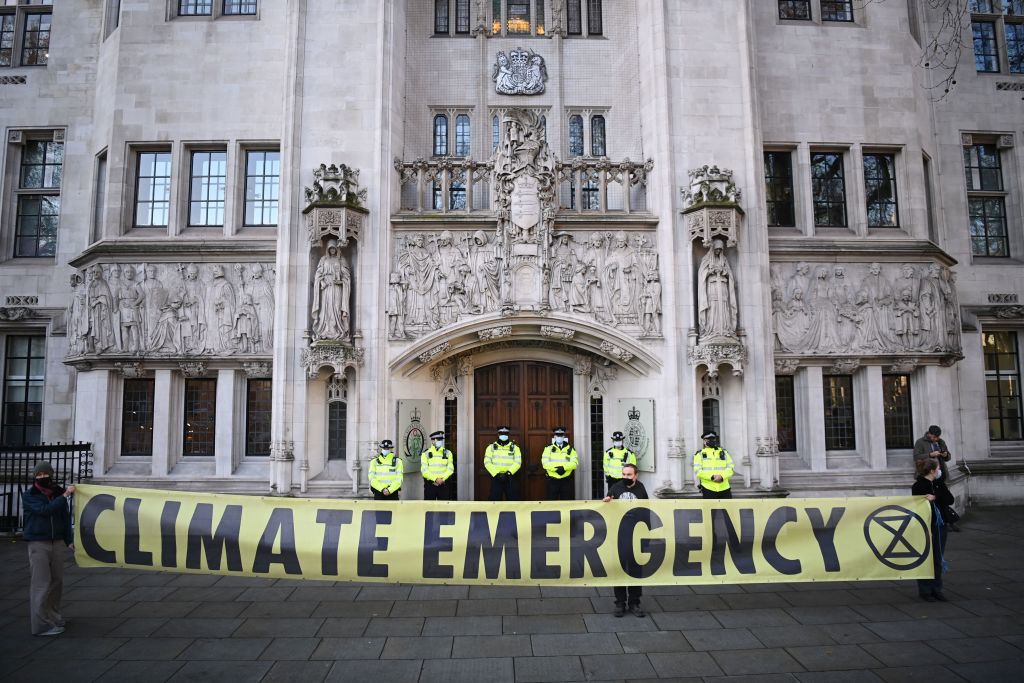It was always a racing certainty that this week’s ‘Swiss grannies’ climate change judgment in Strasbourg would spawn a new wave of environmental lawfare and give new life to that already in progress. A taste of the brave new future duly came from the High Court in London yesterday.
Section 58 of the Climate Change Act requires the government periodically to lay before parliament its objectives to deal with climate change. The government has duly produced a so-called ‘National Adaptation Programme 3’, but some people say it is not good enough. They include pressure group Friends of the Earth, and two individuals alleging injury due to climate change: the owner of a Norfolk house that fell into the sea when a cliff collapsed, and a Yorkshire care home resident particularly vulnerable to overheating during seasonal heatwaves.
In theory the Climate Change Act was passed by an elected government and its interpretation by the courts is therefore democratically impeccable.
Yesterday this group of claimants got permission from the High Court to sue the government and make it draw up a new plan more to their liking. By way of summary, the claimants said – as did the Swiss lot – that the present plan inadequately protected their rights to life, and to private and family life, under the ECHR. They also argued that in its effects it unacceptably discriminated against disadvantaged groups.
The legal details, for the most part mind-numbingly tedious, we can happily leave to the lawyers. Rather more important is a more general question: should we welcome this is sort of thing coming in front of our domestic courts at all? The answer, I would suggest, is no.
For one thing, law traditionally is about simple, precise duties to act or not. Judicial orders are correspondingly in most cases a straightforward ‘Do X,’ or ‘Do not do Y.’ The Climate Change Act, however, is not like this. It is a turgid and at times impenetrable piece of legislation overwhelmingly concerned with open-ended duties, objectives, plans and targets. If this claim succeeds, any judicial order made under it will have to be correspondingly complex: take account of this body’s views or this fact, make sure this objective is fulfilled, impose this timescale, or whatever. This is not what we have courts for. This is something administrators are well-placed, and the judiciary very badly-equipped, to do.
It is also likely, ironically, that even though nearly everyone accepts that we need to take steps to deal with climate change, this judicialisation will actually make the process more difficult. The necessity for ministers and senior civil service executives to prepare innumerable tick-boxes based on legal advice, and then go through a meticulous process of ticking them and recording their reasoning in every case, to immunise themselves from a possible judicial review, can only make the whole process even more cumbersome than it is at present.
It will also create a danger of subtly skewing the process of decision-making. The impact of climate change and the measures necessary to deal with it will always be controversial: judicial review in such matters, however, will always be driven by the climate activists. In drawing up plans in such a way as to avoid possible judicial reviews, administrators will therefore be strongly incentivised to err on the side of the environmentalists, whatever the effects on other matters, such as the economy as a whole. By this means, the environmentalist pressure-groups and their allies gain a de facto advantage from always having the government on the back foot.
And of course, apart from that, there is an important issue of democracy. True, in theory the Climate Change Act was passed by an elected government and its interpretation by the courts is therefore democratically impeccable. The reality is rather different. With open-ended and imprecise legislation like this, the more extensive judicial review becomes, in practice the more decision-making is transferred from elected politicians to unelected judges proceeding on what they are told by unelected pressure-groups. The addition to this of human rights considerations, which are explicitly based on the views of the transnational great and good, merely exacerbates the problem.
This matters. The just-about-managing, for whom revised net zero plans mean being told to lug home their week’s shopping on the bus, replace their runabout cars with pricey electric ones and supplant their trusty gas boilers with temperamental and expensive heat pumps, deserve their say. Instead, powers of decision are transferred from elected governments which people can kick out, to a congeries of lawyers, courts and human rights experts. And when ordinary people lose faith in democracy things can turn ugly. Environmentalists and their well-meaning supporters seeking an ever-expanding judicialisation of environmental law would do well to bear this in mind.







Comments